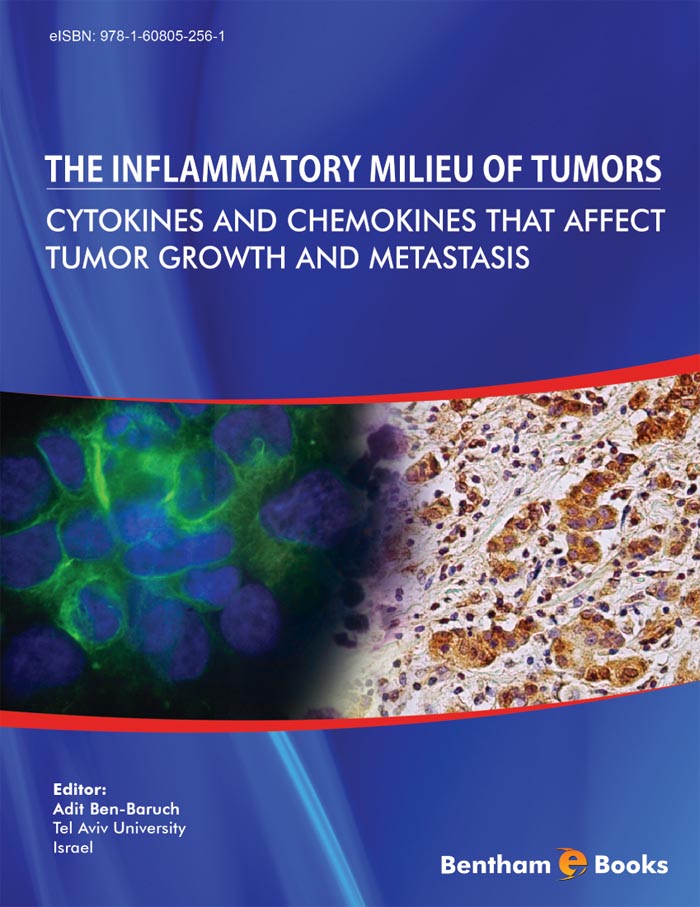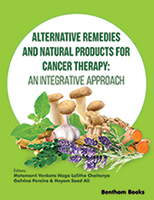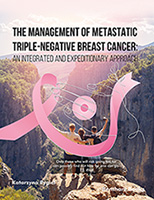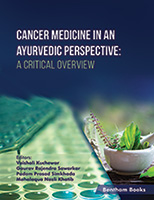Tumor development and progression are multi-factorial processes, in which genomic alterations and modifications in gene expression in pre-malignant cells are joined by deleterious microenvironmental factors. The tumor milieu contains stroma cells and leukocytes, soluble factors and matrix components. The intensive interplay that exists between such host factors and the tumor cells plays a major role in dictating the final outcome of the malignant process.
Of the different microenvironmental factors that are present at the tumor milieu, much emphasis was recently given to inflammatory mediators. Inflammatory components may represent early efforts of the host to combat the arising tumor; however, failure to survey the developing tumor and inappropriate control of the inflammatory process may skew the inflammatory mediators into pro-malignancy factors. The inflammatory components support cell growth and invasion, induce mutagenesis, increase angiogenicity, and suppress potential anti-tumor immune functions.
Accordingly, extensive research that has been undertaken in the last several years has led to the current concept, suggesting that the inflammatory milieu in tumors is often overloaded with “enemies within”, that may be used by the malignant cells for their own benefit. The inflammatory constituents that prevail in tumors include leukocytes and soluble mediators. Of the different soluble factors, the focus was put on inflammatory cytokines and chemokines.
The aim of the present eBook is to provide in depth description of the roles played by inflammatory mediators in malignancy, and to set the basis for their consideration as therapeutic targets in cancer. The first seven chapters of the eBook describe the tumor microenvironment and its inflammatory components: cells, cytokines and chemokines. The next two chapters describe additional with important cytokines of the tumor microenvironment that are not directly connected to inflammation. The eBook concludes with a chapter describing the potential use of microenvironmental mediators as therapeutic targets in malignancy.
Specifically, the eBook begins by an introductory chapter, presenting the metastatic microenvironment (Chapter 1). This chapter exemplifies the important roles of the microenvironment in metastasis by discussing the large variety of components that contribute to brain metastases (Chapter 1). This chapter is followed by detailed description of the inflammatory microenvironment that prevails in many tumors (Chapter 2). Thus, Chapter 2 describes the cells participating in cancer-related inflammation, and also addresses the value of these cells, and of their products, as potential therapeutic targets in malignancy.
Chapter 3 and Chapter 4 discuss in a detailed manner two inflammatory cytokines that are present at the tumor microenvironment, tumor necrosis factor (TNF) and interleukin 1 (IL-1). Chapter 3 provides a very comprehensive overview of TNF in cancer biology, emphasizing the complex nature of the cytokine and of its doubled-edged effects, at the tumor milieu. Chapter 4 describes IL-1 as a key regulator of the balance between inflammation and immunity at the tumor microenvironment, and highlights the roles played by members of the IL-1 family in many aspects of the cancerous process.
The three next chapters are devoted to inflammatory chemokines in malignancy. In Chapter 5, the focus is put on the ELR-expressing CXC chemokines, describing the major roles of these factors in promoting angiogenesis. Contrasting the activities of the ELR-expressing CXC chemokines, the anti-angiogenic properties of non-ELR CXC chemokines that act through CXCR3, are discussed in Chapter 6. Chapter 6 also illuminates the controversial roles of these chemokines in cancer, manifested by their ability to control leukocyte infiltration to tumor sites and to regulate directly tumor-promoting properties in the tumor cells. This part of the eBook concludes with Chapter 7, in which the multifaceted roles of CC chemokines in malignancy are discussed. The chapter illustrates the pro-malignancy functions of the two chemokines, which are mediated by their roles as typical inducers of leukocyte motility, but also by regulating other malignancy-related functions.
Together, the above-mentioned chapters of the eBook emphasize the divergent functions of inflammatory cells and soluble mediators in malignancy. To provide a more comprehensive view of the tumor microenvironment, these chapters are followed by two chapters addressing additional components of the tumor milieu: the family of homeostatic chemokines (Chapter 8) and transforming growth factor ß (TGFß) (Chapter 9). The chapter on homeostatic chemokines (Chapter 8) describes the characteristics and functions of members of this functional sub-family of chemokines, including in malignancy. Chapter 9 provides a very broad and extensive discussion on the multiple roles of TGFß at the cancer microenvironment, discussing the challenging observations on its tumor-suppressive, alongside with tumor-promoting effects, in cancer.
Following these chapters, demonstrating the high complexity and combined activities of multiple cells and factors at the tumor milieu, Chapter 10 discusses the potential therapeutic implications of the different components that are found in proximity to the developing and metastasizing tumor cells, and describes work-in-progress that is performed in this respect.
Overall, the eBook provides an overview of the different components of the tumor microenvironment, and illustrates the roles played by inflammatory and non-inflammatory components in malignancy. The different chapters of the eBook emphasize the complexity of the cancer milieu, and the fact that often many of its elements are skewed to the pro-malignancy phenotype.
The topics addressed in the eBook are of interest to investigators who study basic aspects of the malignant process, to clinicians who wish to better understand the processes involved in malignancy, and to pharmacological companies that seek novel candidates for therapeutic intervention in cancer.
Adit Ben-Baruch
Department of Cell Research and Immunology
George S. Wise Faculty of Lift Sciences
Tel Aviv University
Israel





